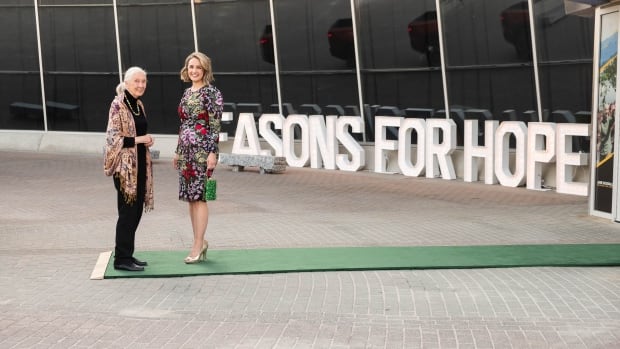
An IMAX documentary about scientist Jane Goodall, produced by Sudbury’s Science North, has won four awards from the Giant Screen Cinema Association (GSCA).
Jane Goodall: Reasons for Hope follows the English zoologist and environmentalist as she travels the world and shares her reasons to have hope for the future.
It won awards from the GSCA for best film for lifelong learning, best film (short subject), best film launch by a theatre and best big idea.
“Jane Goodall is the most famous and influential champion of the environment we have today. Working with her was an amazing experience for everyone on the crew,” said the film’s director, David Lickley, in a news release.
“This award [best film for lifelong learning] is the highest honour the Giant Screen Industry can bestow and it will help promote the film in theatres around the world, further extending Jane’s message.”
Science North produced the movie in association with the Jane Goodall Institute, the Arizona Science Center, and with distribution by Cosmic Picture.
“We are incredibly proud to see our collaborative efforts recognized on such a grand scale,” Science North CEO Ashley Larose said in a news release.
“The awards are a testament to the innovation and dedication of our team. In collaboration with our partners, we are thrilled to have created something that inspires hope and action.”
Brenda Tremblay, the movie’s line producer and co-executive producer, told CBC News the film, which premiered in May 2023, has received a positive reception from audiences around the world.
“What we’re hearing, basically, it’s nice to have, it’s enlightening, it’s a happy story,” she said.
“It’s not doom and gloom. Here are some great ways that people are making a difference in the world and let’s all get onboard. Let’s all just do our little part.”
Tremblay says she’s particularly proud the movie was made in a carbon neutral manner in order to align with Jane Goodall’s values.
That was done by minimizing air travel whenever possible, using batteries instead of generators and purchasing carbon offsets to make up the difference.
Tremblay says the electric vehicle company Rivian was one of the movie’s sponsors, and supplied its vehicles to haul equipment back and forth.